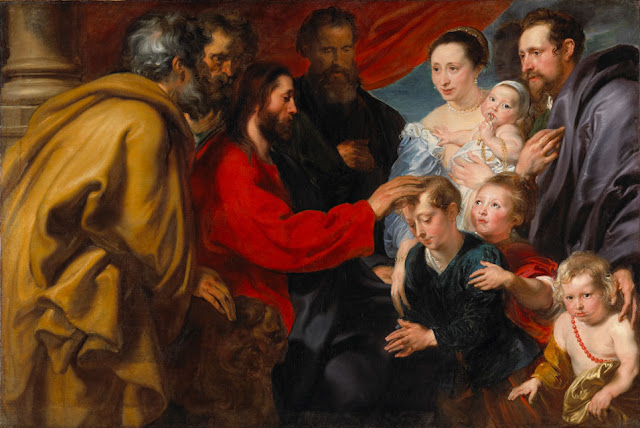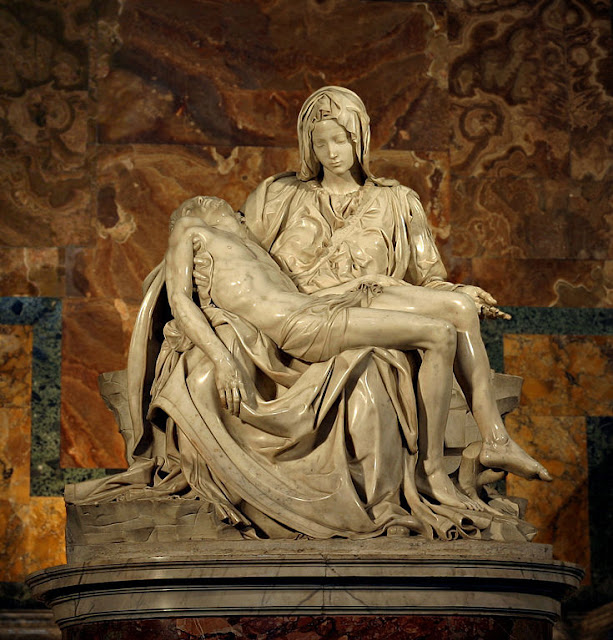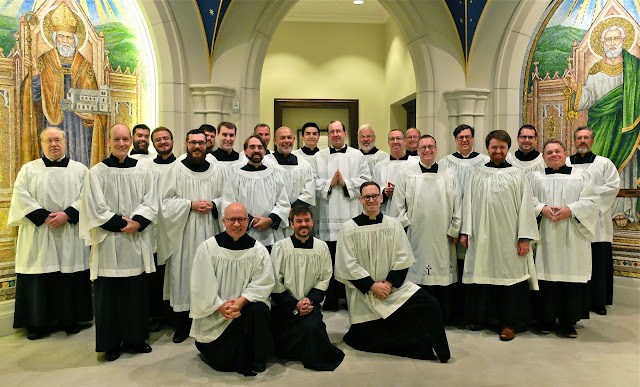Benedict Rising
 |
| Anthony van Dyck, Suffer Little Children To Come Unto Me |
Pope Emeritus Benedict has trained his brilliant mind on the topic of the abuse scandal. Retaining that luminous clarity for which he was well known, Papa Benedict identifies several trajectories (categorized by yours truly, summarized by including phrases from Benedict's essay):
- A forced loss of innocence: all out sexual freedom.
- The collapse of moral theology.
- The dissolution of the moral teaching authority of the Church and the breakdown of priestly formation: the aftermath of the 1960s.
- The question of pedophilia: "Only where Faith no longer determines the actions of man are such offenses possible."
- The failure of the alter-Church.
- The future is a restoration of liturgical integrity.
- The Mystery of the Church: the triumph of God.
In Benedict XVI's words:
My work is divided into three parts.
- In the first part, I aim to present briefly the wider social context of the question, without which the problem cannot be understood. I try to show that in the 1960s an egregious event occurred, on a scale unprecedented in history. It could be said that in the 20 years from 1960 to 1980, the previously normative standards regarding sexuality collapsed entirely, and a new normalcy arose that has by now been the subject of laborious attempts at disruption.
- In the second part, I aim to point out the effects of this situation on the formation of priests and on the lives of priests.
- Finally, in the third part, I would like to develop some perspectives for a proper response on the part of the Church.
The following text is an excerpt from the second part of the first section.
[...] Catholic moral theology suffered a collapse that rendered the Church defenseless against these changes (e.g., "all-out sexual freedom, one which no longer conceded any norms") in society. I will try to outline briefly the trajectory of this development.
Until the Second Vatican Council, Catholic moral theology was largely founded on natural law, while Sacred Scripture was only cited for background or substantiation. In the Council’s struggle for a new understanding of Revelation, the natural law option was largely abandoned, and a moral theology based entirely on the Bible was demanded.
I still remember how the Jesuit faculty in Frankfurt trained a highly gifted young Father (Bruno Schüller) with the purpose of developing a morality based entirely on Scripture. Father Schüller’s beautiful dissertation shows a first step towards building a morality based on Scripture. Father Schüller was then sent to America for further studies and came back with the realization that from the Bible alone morality could not be expressed systematically. He then attempted a more pragmatic moral theology, without being able to provide an answer to the crisis of morality.
In the end, it was chiefly the hypothesis that morality was to be exclusively determined by the purposes of human action that prevailed. While the old phrase “the end justifies the means” was not confirmed in this crude form, its way of thinking had become definitive. Consequently, there could no longer be anything that constituted an absolute good, any more than anything fundamentally evil; [there could be] only relative value judgments. There no longer was the [absolute] good, but only the relatively better, contingent on the moment and on circumstances.
The crisis of the justification and presentation of Catholic morality reached dramatic proportions in the late ’80s and ’90s. On January 5, 1989, the “Cologne Declaration,” signed by 15 Catholic professors of theology, was published. It focused on various crisis points in the relationship between the episcopal magisterium and the task of theology. [Reactions to] this text, which at first did not extend beyond the usual level of protests, very rapidly grew into an outcry against the Magisterium of the Church and mustered, audibly and visibly, the global protest potential against the expected doctrinal texts of John Paul II (cf. D. Mieth, Kölner Erklärung, LThK, VI3, p. 196) [LTHK is the Lexikon für Theologie und Kirche, a German-language “Lexicon of Theology and the Church,” whose editors included Karl Rahner and Cardinal Walter Kasper.]
Pope John Paul II, who knew very well the situation of moral theology and followed it closely, commissioned work on an encyclical that would set these things right again. It was published under the title “Veritatis splendor” on August 6, 1993, and it triggered vehement backlashes on the part of moral theologians. Before it, the “Catechism of the Catholic Church” already had persuasively presented, in a systematic fashion, morality as proclaimed by the Church.
I shall never forget how then-leading German moral theologian Franz Böckle, who, having returned to his native Switzerland after his retirement, announced in view of the possible decisions of the encyclical “Veritatis splendor” that if the encyclical should determine that there were actions which were always and under all circumstances to be classified as evil, he would challenge it with all the resources at his disposal.
It was God, the Merciful, that spared him from having to put his resolution into practice; Böckle died on July 8, 1991. The encyclical was published on August 6, 1993 and did indeed include the determination that there were actions that can never become good.
.jpg)





Comments
Post a Comment
Your comments will be appreciated and posted if 1) they are on topic and 2) preserve decorum.
Stand by your word.